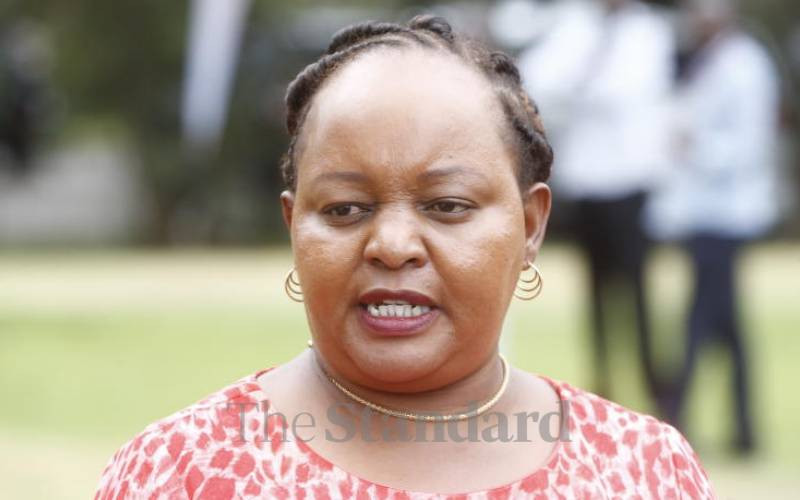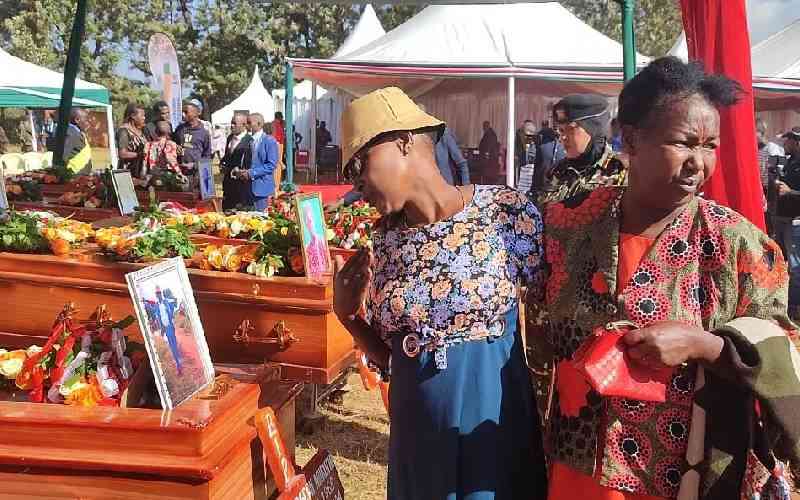 |
|
UAP CEO, Mr James Wambugu, Fridah Nyambura, and the General Manager Majani Insurance Brokers, Ms Mumbi Gitonga. |
A small-scale farmer in Kagio, Kirinyaga County, on December 19 got a reprieve when she received Sh836,000 as compensation after she lost 16 cows to poisonous feed.
The payout, under the new Livestock Insurance cover launched in 2013 by Majani Insurance Brokers in partnership with UAP Insurance Ltd, is reportedly the highest in micro-insurance.
Fridah Nyambura Mwangi, wife to an electrician and a mother of four, lost her 16 bulls after she fed them on maize stalks she had accidentally mixed with the poisonous Datura plant. “I am really happy. I did not believe that I was going to get this money until I saw them (UAP and Majani Insurance Brokers officials),” said an elated Nyambura on her payment.
“When the tragedy struck I was so confused, I just cried. I didn’t even think about insurance at the time. It was the veterinary doctor who after doing the post-mortem advised me to make a claim,” she said.
In July 2014, she was informed by her brother who works at a tea factory of the availability of livestock insurance. She decided to take it, paying a premium of Sh52,150. The bulls were to be ready for sale this December.
Like many other ordinary rural folk, paying Sh52,000 was going to be a painful venture. “At first I thought it was a lot of money, but when I looked at my investment of around Sh700,000 I found it worthwhile,” she said.
Indeed, it was such calamities that drove her into taking up the cover. In 2009 when she lost several calves. She was worried that if this continued all her efforts would have amounted to nothing.
Insuring her livestock became even more necessary when she bought the bulls at the beginning of this year. Nyambura is not the first to benefit from the Livestock Insurance. Of the more than 1,000 farmers insured under this policy, about 100 have so far benefited.
Indigenous cows
“The farmers we paid before did not get as much money as what Nyambura has. This is the highest payout,” said Majani Insurance Brokers the General Manager Mumbi Gitonga.
“We are continually entrenching our brand by developing other micro-insurance products based on experiential feedback from the same farmers who have taken cover.” But the business, she said, can also be risky. “You make a lot of trips to rural areas for sensitisation programmes and receive as little as Sh400 as premium from the farmers. If you are not careful, it won’t make any business sense,” she says.
UAP Managing Director James Wambugu, while handing over the cheque, advised Nyambura to spread the good news to other farmers. “We (Insurance providers) do not make money. The best way for us to protect you is by you people pooling together so that your money is used to compensate others. That is how we reduce the risk,” explained Mr Wambugu.
With the money, Nyambura plans to buy other cows, especially indigenous ones. She will also use the money to expand her structures for the bulls. Nyambura and her husband got into livestock farming in 2006. Before that they engaged in poultry keeping.
Nyambura is a trained teacher but she can’t abandon her farming for teaching. “The salary I could have earned from teaching cannot be compared to the income I am getting from livestock farming,” she said. She makes about Sh5,000 each week from selling milk. After three months she makes around Sh50,000. Currently, she has 11 cows.
She also grows maize, bananas and sweet potatoes on her three-and-a-half hectares of land. She also has two fishponds. She said insurance is critical. “My advice to other farmers is that they should take up insurance cover just in case of an outbreak such as this,” she said.
Stay informed. Subscribe to our newsletter
 The Standard Group Plc is a
multi-media organization with investments in media platforms spanning newspaper
print operations, television, radio broadcasting, digital and online services. The
Standard Group is recognized as a leading multi-media house in Kenya with a key
influence in matters of national and international interest.
The Standard Group Plc is a
multi-media organization with investments in media platforms spanning newspaper
print operations, television, radio broadcasting, digital and online services. The
Standard Group is recognized as a leading multi-media house in Kenya with a key
influence in matters of national and international interest.
 The Standard Group Plc is a
multi-media organization with investments in media platforms spanning newspaper
print operations, television, radio broadcasting, digital and online services. The
Standard Group is recognized as a leading multi-media house in Kenya with a key
influence in matters of national and international interest.
The Standard Group Plc is a
multi-media organization with investments in media platforms spanning newspaper
print operations, television, radio broadcasting, digital and online services. The
Standard Group is recognized as a leading multi-media house in Kenya with a key
influence in matters of national and international interest.









